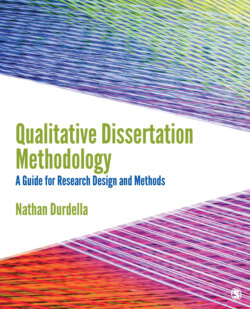Читать книгу Qualitative Dissertation Methodology - Nathan Durdella - Страница 74
На сайте Литреса книга снята с продажи.
Collaborating with faculty and peers to advance qualitative dissertation methodology.
ОглавлениеIn addition to coursework, the work that students do outside of class can relate directly to dissertation research. In fact, a range of options may be available to students on and off campus to support dissertation work, including the following (see Figure 2.3):
Funded or sponsored faculty research generally supports graduate student dissertation research. Where faculty serve as a principal investigator or co-principal investigator on an extramurally funded project—whether publically sponsored or privately gifted—student opportunities in project administration positions and research assistantships emerge. These positions may offer students experiences in instrumentation, data collection, data analysis, and dissemination. Moreover, students may learn about approaches to grant writing, proposal development, project implementation, and program evaluation. What is more, funding programs tend to run the gamut of academic fields and sometimes present transdisciplinary opportunities to collaborate—so the odds of extending a professional network and enhancing skills that are both applicable directly to dissertation research and marketable for careers in the academy accompany this work.
▼ Figure2.3 Sources of Support for Doctoral Student Research
Unfunded faculty research often forms significant research and writing experiences of graduate students, particularly with faculty advisors and/or committee members. When faculty offer students an opportunity to research, write, publish, and/or present their work, the insight, skills, and knowledge that they develop can be both meaningful and helpful to professional preparation and career development. Some examples of unfunded faculty research include book reviews, reference or encyclopedic entries, edited volume contributions (i.e., chapters), and monographs. With these scholarly activities, students often can apprentice with faculty and build academic capital related to publishing and/or presenting work in refereed journals, with academic publishers, and in professional associations—all of which supports skills needed to design and execute dissertation research projects.
Teaching assistantships frequently offer graduate students opportunities to work in the classroom—directly with faculty and independently on their own. In some institutional and program contexts, professional faculty development in teaching and learning is available—providing rich resources to support graduate student identities and skills as instructors. While not all programs offer degree-applicable courses in instructional training, getting into the classroom in a teaching assistantship role and working with a faculty instructor directly with students represent some of the most important experiences for graduate students. Indeed, this work has far-reaching implications for careers in the academy and some related fields. For dissertation studies, teaching can lead to opportunities for students to learn how to integrate two prominent and related areas of academic practice—teaching and research. More broadly, possible skills that students develop as teaching assistants include learning how to manage the classroom, address student learning issues, developing material and activities that support a range of student learning styles and that accommodate students with disabilities, evaluating and scoring student work, developing strategies to address student violations of academic integrity policies, and operating within institutional grievance and disciplinary structures.
Research and service center assistantships and fellowships may serve as prospective opportunities to develop similar skills as work in funded and sponsored faculty research projects. Outside of formal program and department positions such as research or teaching assistantships, institution- or program-affiliated research or services centers may employ graduate students to support institutional and contract projects. Often national in scope, these centers generally focus on a selected area of research and/or practice—perhaps related to students’ dissertation research projects—so students can participate in a range of scholarly activities and events that connect them to scholars, educational leaders, policy makers, and/or leading thinkers in the field.
Faculty service projects, such as university committee service, community service projects, or professional association service, may offer students opportunities to connect with new colleagues across campus, enhance their understanding of institutional operations, and build skills that could serve them well in academic or administrative positions—while offering students a chance to consult widely with folks who may potentially help shape their dissertation research.
Graduate student service positions tend to connect students to new professional networks, whether on campus or in professional associations. Roles such as graduate student representative or liaison support the development of a broader view of program, departmental, institutional, or organizational processes and policies, which ultimately may support dissertation research development and overall early career faculty or administrator development.
Institutional or professional association fellowships represent a chance for students to develop practical skill sets in an area of research and/or practice usually with an organization (if not with the college or university) closely allied to students’ program of study. Like with other opportunities, this type of work may allow for students to consult more broadly on issues related to dissertation research and further develop skills applicable to dissertation research contexts.
Editorial service work with research and/or practitioner journals or academic publishers tends to support insight into issues that permeate academic research and writing—enhancing student skills to write their own dissertations. Here, what seems to work well relates to this logic: When you read research, you write research.
All of these opportunities generally support student dissertation work—from exploring a potential dissertation advisor and committee members to developing and refining dissertation ideas and advancing dissertation proposal and final dissertation development. Beyond academic program and career implications, a bonus for some of these positions relates to personal finance: tuition and fee reductions/remissions/waivers. My advice: Build your network and search for one or more of these opportunities. Sometimes you need to ask directly to find opportunities, and you should consider every chance to work collaboratively with faculty.
